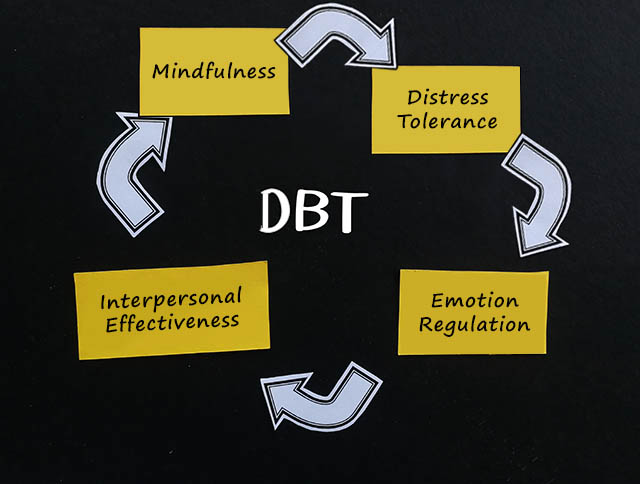
DBT THERAPY
Clinically Reviewed By Matt Beck, LMFT
What Is Dialectical Behavioral Therapy?
Dialectical Behavioral Therapy (DBT) is a cognitive-behavioral approach that emphasizes problem-solving and acceptance. Initially, it is used for severe mental health issues, but it also aids those who struggle with traditional therapies. DBT is based on dialectics, viewing life as a balance between conflicting forces. Positive change happens through constructive conversations between these opposing elements.
In a typical DBT session, a patient collaborates with his or her therapist to balance the push for acceptance against the desire for change. This collaboration brings about constructive changes in the patient’s behavior. DBT also closely examines difficult-to-change behaviors while teaching individuals to increase their emotional control and thinking skills.
There are four key strategies comprising DBT that aim at increasing life skills and reducing unhealthy behaviors:
Distress tolerance is an important skill that helps people handle and manage emotional pain positively. It offers strategies for dealing with tough feelings and situations without resorting to harmful behaviors or avoidance. Learn more about mindfulness-based relapse prevention techniques that complement distress tolerance.
Emotional regulation is crucial for our reactions to situations. It entails recognizing, managing, and expressing emotions, enhancing emotional intelligence and relationships. Focusing on this helps us better manage feelings and tackle challenges. Explore tips on overcoming depression and enhancing emotional regulation.
Mindfulness enables people to concentrate on their present thoughts and emotions without making judgments. It promotes an awareness of the current moment, which boosts emotional understanding and supports mental health wellness. Learn how mindfulness enhances mental health.
Interpersonal effectiveness aims to improve communication skills and strengthen relationships. By developing our ability to express our thoughts and feelings clearly, we build deeper connections and understanding in personal and professional interactions. Read about how to enhance self-awareness through therapy.
Benefits of DBT Therapy In Addiction and Mental Health Treatment
DBT also treats people with substance abuse disorders and other mental health conditions. Many lack the necessary skills to handle the issues that contribute to their self-destructive behaviors; DBT teaches them how to develop healthy skills to replace harmful behaviors.
DBT emphasizes distress tolerance, emotional regulation, and mindfulness as essential to recovery. Distress tolerance offers ways to deal with situations without resorting to substance abuse. In early recovery, emotional regulation helps one manage feelings to reduce suffering and increase general well-being.

Mindfulness also boosts self-awareness, enabling individuals to observe their thoughts and feelings. It enhances relationships, improves communication, minimizes conflicts, and reduces difficult emotions through non-judgmental awareness. Learn about stress management techniques to support early recovery.
Early in recovery, stress is one of the most potent triggers for relapse. Distress tolerance teaches the person to bear their distress, thereby reducing the urge to escape substances or self-destructive behaviors. DBT provides a framework that addresses emotional and relational challenges, supporting lasting recovery. Explore how DBT helps in addiction recovery.
FAQs about Dialectical Behavioral Therapy (DBT)
Find Out If Your Insurance Covers Treatment
We accept most major health insurance.
Check your benefits coverage online or call now to receive a private, no-obligations consultation for yourself or your loved one.
At Twelve South Recovery, we use proven therapies, and an evidence-based approach to addiction and mental health treatment.
WE SPECIALIZE IN:
SOME OF THE ADDICTIONS WE TREAT:
INFORMATION REQUEST
CONTACT INFORMATION
ADDRESS
23712 Birtcher Drive,
Lake Forest, CA 92630
PHONE:
866-839-6876
EMAIL:
ADMISSIONS@12SOUTHRECOVERY.COM



























